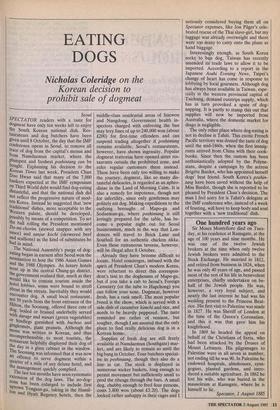EATING DOGS
Nicholas Coleridge on the
Korean decision to prohibit sale of dogmeat
Seoul SPECTATOR readers with a taste for dogmeat have only ten weeks left to enjoy • the South Korean national dish. Res- taurateurs and dog butchers have been given until 8 October, the day that the IMF conference opens in Seoul, to remove all trace of dog from the capital's menus and from Namdaemun market, where the Plumpest and freshest poshintang can be bought. Explaining his decision to the Korean Times last week, President Chun Dou Hwan said that many of the 7,000 bankers expected at the IMF symposium on Third World debt would find dog-eating distasteful, and that the national dish did not reflect the progressive nature of mod- ern Korea. Instead he suggested that 'new traditional dishes, more acceptable to the Western palate, should be developed, possibly by means of a competition. To set the ball rolling the President mentioned bo-rni-chorim (stewed snapper with soy sauce) and sanjur kochi (skewered beef and scallions) as the kind of substitutes he had in mind.
The National Assembly's purge of dog- eating began in earnest after Seoul won the nomination to host the 1986 Asian Games and the 1988 Olympics. As luxury hotels went up in the central Chung-gu district, the government realised that, much as they would like to contain tourists inside the hotel lobbies, some were bound to stroll about in the streets. Inevitably they would encounter dog. A small local restaurant, not 50 yards from the front entrance of the Hilton, the Soonung, offered three cuts of dog: boiled or braised underbelly served with .darage and minari (green vegetables) Or hindlegs garnished with buchoo and gingkonuts, giant peanuts. Although the tn. enu was written in Korean, and thus incomprehensible to most tourists, the restaurant helpfully displayed their dog of the day in a glass cabinet in the window. The Soonung was informed that it was now an offence to serve dogmeat within a quarter of a mile of any deluxe hotel, and the management quickly complied. The last ten months have seen systematic extension of the dog laws. The no-dog- zone has been enlarged to include first uptown Yongsan-gu, taking in the Hamil- ton and Hyatt Regency hotels, then the middle-class residential areas of Itaewon and Nungdong. Government health in- spectors charged with enforcing the ban may levy fines of up to 240,000 won (about £200) for first-time offenders and can suspend trading altogether if poshintang remains available. Seoul's restaurateurs, however, have shown ingenuity. Popular dogmeat trattorias have opened sister res- taurants outside the prohibited zone, and refer regular customers there instead. These have been only too willing to make the journey; dogmeat, like so many dis- tasteful delicacies, is regarded as an aphro- disiac in the Land of Morning Calm. It is also a remedy for impotence, though not for infertility, since only gentlemen may politely eat dog. Making expeditions to the outlying boroughs of Mapo-gu and Sodaemun-gu, where poshintang is still lovingly prepared for the table, has be- come a popular night out for Seoul businessmen, much in the way that Lon- doners will travel to Brick Lane and Southall for an authentic chicken tikka. Even these extraneous taverns, however, will.be illegal after 8 October.
Already they have become difficult to locate. Hotel concierges, imbued with the spirit of President Chun's modern Korea, were reluctant to direct this correspon- dent's taxi to the doghouses of Mapo-gu, ' but if you take a cab to Seoul's Foreign Cemetery (or the tube to Hapchong) you can follow your nose. Dogmeat, however fresh, has a rank smell. The most popular breed is the chow, which is served with a side dish of cucumber kimchi and rice, and needs to be heavily peppered. The taste reminded me rather of venison, but tougher, though I am assured that the only place to find really delicious dog is in a Korean home.
Supplies of fresh dog are still freely available at Namdaemun (Southgate) mar- ket, and are likely to remain so until the big bang in October. Four butchers special- ise in poshintang, though they also do a line in cat. The stock is displayed in numerous wicker baskets, long enough to permit movement but sufficiently small to prod the ribcage through the bars. A small dog, chubby enough to feed four persons, costs 3,800 won (about f3.20). The dogs looked rather unhappy in their cages and I seriously considered buying them all on Spectator expenses, like Jon Pilger's cele- brated rescue of the Thai slave-girl, but my luggage was already overweight and there were too many to carry onto the plane as hand baggage.
Interestingly enough, as South Korea seeks to ban dog, Taiwan has recently amended its trade laws to allow it to be imported. According to a report in the Japanese Asahi Evening News, Taipei's change of heart has come in response to lobbying by local gourmets. Although dog has always been available in Taiwan, espe- cially in the western provincial capital of Taichung, demand outstrips supply, which has in turn provoked a spate of dog- napping. It is partly to stamp this out that supplies will now be imported from Australia, where the domestic market for dingo is negligible.
The only other place where dog-eating is not in decline is Tahiti. This exotic French Pacific territory was denied the taste of dog until the mid-1860s, when the first immig- rants arrived from China with their cook- books. Since then the custom has been enthusiastically adopted by the Polyne- sians, despite a campaign by the actress Brigitte Bardot, who has appointed herself dogs' best friend. South Korea's poshin- tang have been saved without the help of Miss Bardot, though she is reported to be pleased by President Chun's decision. The man I feel sorry for is Tahiti's delegate at the IMF conference who, instead of a week of feasting, will have to keep body and soul together with a 'new traditional' dish.










































 Previous page
Previous page